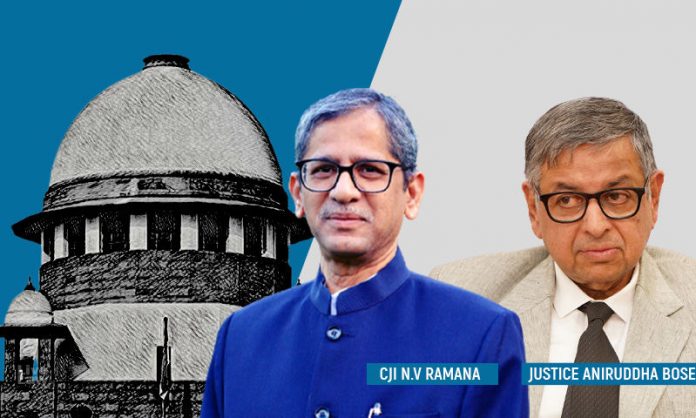
This article is written by Vidhi Birmecha, pursuing an Introductory Course to Legal Writing from Lawsikho.
Table of Contents
Introduction
- Case name – Gurmeet Singh v. The State of Punjab
- Citation – Criminal appeal no. 1731 of 2010
- Judgement date – 28th May 2021
- Court – Supreme Court of India
- Bench – Hon’ble CJI N.V.Ramana, Surya Kant, Aniruddha Bose
After 72 years of Independence, living in the 21st century, we have been able to get rid of many social evils. Yet what has not left the minds of Indian people is the concept of dowry. The case of Gurmeet Singh vs the State of Punjab is one such case, wherein the accused-appellant has harassed and physically assaulted the deceased as the demand of dowry was not fulfilled. The court held that all the essential ingredients of Section 304B IPC have been satisfied and the appellant’s appeal was dismissed. The case mentioned below is of utmost significance regarding dowry death and focuses on how it is still a major social evil.
Procedural history
The above case Gurmeet Singh vs The State of Punjab falls under the appellate criminal jurisdiction and has been an appeal from the accused. The earlier judgement dated 15.03.2010 was passed by the High Court of Punjab and Haryana at Chandigarh via a criminal appeal. Both the High Court and Trial Court dismissed the appeal and convicted the appellant under Section 304-B IPC and sentenced him to undergo rigorous imprisonment for seven years and a fine of Rs.5000/-
Facts of the case
- The deceased (daughter) and accused(son-in-law) were engaged in 2004. Later, when the complainant (father of the deceased daughter) left for Abu Dhabi in April 2004. They solemnized their marriage on 23.11.2004 and gave birth to a child in 2006.
- The deceased was subjected to physical assault according to the demand of dowry by father-in-law, mother-in-law, and the appellant-husband. When the complainant returned to India in 2007 and was informed about the demand. Allegedly, they gave a gold chain to the accused persons. Later, it also came to light that, again the in-laws have demanded money for the purchase of a car. However, this time the demand was not fulfilled.
- On 08.08.2008 it was informed by the father-in-law of the deceased to the complainant that the deceased had consumed poison and due to that lost consciousness and was taken to the hospital. It was found by the complainant that his daughter was unconscious. Later that day, she died.
- The trial court order dated 03.09.2009 convicted the appellant-husband, father-in-law, and mother-in-law for the offence under Section 304-B and sentenced them to undergo rigorous imprisonment for seven years each and a fine of Rs 5000 each. In default of the payment of fine, the accused were directed for imprisonment for one year each.
- Later, the aggrieved party approached the High Court in appeal and the judgement dated 15.03.2010, acquitted father-in-law and the mother-in-law, but upheld the order of conviction stated by the Trial Court.
- Challenging the above-mentioned judgement of the High Court of Punjab and Haryana, the accused-appellant approached the Supreme court of India.
Issues before the court
- Whether the accused-appellant has committed the offence of dowry death?
- Have the ingredients of Section 304-B IPC been satisfied in the present case?
- Has the High Court of Punjab and Haryana and Trial Court committed any error in convicting the appellant under the said section?
Rules applied
The provisions in question in aforesaid judgement are Section 304-B (Dowry death) and Section 498-A (Husband or relative of husband of a woman subjecting her to cruelty).
- Section 304-B(1) IPC defines the dowry death of a woman. It has been stated that whenever death of a woman is due to burning, bodily injury or has occurred not in normal situations within seven years of marriage and soon before her death she was subjected to any kind of cruelty or harassment by her in-laws concerning the demand of dowry can be considered a “dowry death”.
- Section 304-B(2) IPC states for punishment for the above offence, i.e., whoever is found to commit dowry death shall be punished with imprisonment of not less than seven years which may also extend to imprisonment of life.
- Section 498-A IPC talks about the husband or relative of the husband of a woman subjecting her to cruelty. Anyone in the in-laws of the woman who has subjected her to cruelty shall be punished with imprisonment which may extend to three years and shall also be liable to fine.
By the term ‘cruelty, we mean –
- any wilful conduct which may be responsible for a woman to commit suicide or cause grave injury or danger to life, limb, or health (physical or mental) of a woman or
- Harassing the woman where the same is with the view to coerce her or any person related to her to meet any unlawful demand for any property or valuable security or is on account of failure by her or any person related to her to meet such demands.
Party’s arguments
Arguments put forth by Appellant’s counsel
- The counsel appearing for the accused-appellant argued – as a matter of routine, the court has taken into presumption Section 113B of Evidence Act but even the basic and the most essential ingredient of Section 304B IPC is not satisfied as it cannot be said that the deceased soon before her death was subjected to cruelty for the demand of dowry. They contended that the deceased was happy with the appellant because they bore a child and had never previously mentioned any harassment or cruelty being meted out by the appellant. The allegation of gifts taken by the accused from the complainant does not stand as the gifts were voluntarily given by the latter and his family. Lastly, it was pointed out that any charge without coming under Section 498A IPC a conviction under Section 304 B IPC cannot be sustained.
Arguments put forth by Respondent’s counsel
- On the other hand, the counsel on behalf of the State of Punjab argued that the death in the present case has occurred within four years of marriage due to poisoning which cannot be denied. It was known that fifteen days before the incident, the deceased had specifically told her father about the demand for the car. It was also revealed that the accused had forged the medical records of his mother-in-law to show a cordial relationship between the two families. Therefore, the presumption pointed out by the accused-appellant cannot be rebutted.
 Judgement
Judgement
It was held by the Supreme Court of India that the accused-appellant was rightfully convicted under Section 304-B IPC. All the above-mentioned facts match the evidence, testimony and materials put forth by the respondent.
- Both the essential ingredient of Section 304B IPC has been satisfied the death of the deceased occurred in 2008 after she consumed poison in her matrimonial home, fulfilling the first ingredient as to death not in normal circumstances within seven years of marriage and
- The second essential ingredient being the demand for dowry “soon before her death” must be established. It can be interpreted that “soon before” does not mean “immediately before” rather “proximate live link” should be there between the cruelty and the death of the victim due to the former. Herein, the father of the deceased “Sarwan Singh” has constantly brought into the notice that the consistent demand of the car or equivalent cash was demanded by the accused. It was also noted that the deceased had expressed her unhappiness due to the constant harassment.
- To meditate on family relations, the father of the deceased gave certain gifts to the accused.
- Lastly, it came to the attention of the court that the mother of the deceased had informed the father 15-20 days prior to the incident as there was continuous harassment by the accused.
- Both the prior courts found the father of the deceased evidence to be reliable and consistent despite a thorough cross-examination. Taking into consideration all the evidence put forth, the prosecution proved the necessary ingredients under Section 304-B IPC against the accused-appellant.
- It was also pointed out that to prove that both the families shared a cordial relationship, the appellant forged the hospital medical records.
- It was argued by the accused that the deceased was suffering from depression owing to her mother’s health issue, but no evidence was produced either to show the deceased’s depression due to the alleged poor health condition of her mother or to even show that her mother’s health was deteriorating.
- Lastly, it was pointed out by the counsel on behalf of the appellant-accused that without any charges under Section 498A IPC a conviction under Section 304B IPC cannot be sustained. It was held that the said sections are of distinct nature.
- The trial court’s decision has been based on a detailed analysis and does not need any interference. There was no material/evidence put forth by the appellant that could preserve their arguments. Therefore, all the contentions filed by the prosecution stand satisfied.
In the light of the above findings, after closely pursuing the relevant material, evidence, testimony put forth, it was held that the High Court and Trial Court have not committed any error in convicting the appellant under Section 304B IPC as there was a failure in discharging of the burden under Section 113B Evidence Act.
Cases referred by the court
In the recent judgement of “Satbir Singh vs the State of Haryana, the relevance of Section 304-B IPC and Section 113B Evidence Act was stated which plays the key feature in the case of Gurmeet Singh vs the State of Punjab. In the above case, the court cited the essential ingredient of both the sections and its importance while establishing the offence of dowry death.
- Section 304B must be interpreted only with the view of the legislative intent to curb the social evil of bride burning and dowry demand.
- To prove Section 304B the prosecution is required to establish the essential ingredients of the said section which has already been done. Once the ingredients are established, the presumption of Section 113B Evidence Act operates against the accused.
- The phrase “soon before” does not signify immediately before rather it can be interpreted, and the prosecution should establish the existence of “proximate and live link” between the dowry death and cruelty or harassment for dowry demand by the husband or his relatives.
- The death considered under the said section has not been specifically categorized as homicidal or suicidal or accidental. This implies that the death must not have occurred in normal circumstances.
The above points are cited by the appellant’s counsel which the court has corrected with reference to the above case.
In relation to proving the incompetence of charges under Section 304B IPC and Section 498A IPC otherwise, a conviction cannot be sustained. In this aspect, the court referred to the case of Kamesh Panjiyar vs the State of Bihar.
The court has cited explanations about Section 498A IPC and Section 304B IPC as again it forms the basis of a judgement given.
- Both the sections are not necessarily mutually inclusive. It is true that cruelty is a common thread in both the sections mentioned above but that must be proved.
- Section 498A IPC mentions the explanation of the term “cruelty” while Section 304B IPC does not have any explanation of the term, rather it explains the term dowry death and the punishment involved.
- It can also be noted that the term “cruelty” or “harassment” has been taken as a common background is the same as prescribed in Explanation to Section 498A under which cruelty by itself is an offence but in Section 304B it talks about dowry death.
- There is no mention of the time in Section 498A IPC but in section 304B the time of seven years of marriage has been mentioned.
If the case is established there can be a conviction under both sections.
- It has been that the nature of Section 304B IPC can be read with Section 113B Evidence Act – Judges, prosecution and defence should be careful during conduction of trials.
- The nature of the trial court hearing incorporates the valuable principle of “audi alteram partem” as it gives the accused the offer of an explanation for the incriminatory material appealing against him.
- The court must put the accusation before the accused and seek his response. It is the duty of the counsel to prepare his defence keeping in consideration the nature of section 304B IPC reads with Section 113B Evidence Act.
- Section 232 CrPC states that “If after taking the material, evidence by the prosecution, examining the accused and hearing the prosecution and the defence on point, the Judge shall consider that if there is no evidence that the accused committed the offence, the Judge shall record an order of acquittal.
- Once, the Trial Court decides that the accused is not eligible to be acquitted, the provisions of Section 232 CrPC, specifically calls for defence evidence as per the procedure which is not of that value.
- It is also to be noted that other family members of the husband get roped in even though there was not enough active role in the offence committed.
Conclusion
Dowry death is one of the most burning issues still prevalent in Indian society. It is true that we do have legal provisions in place but in spite of that, the ill mentality of some sections of our society is not letting go of this social evil.
Therefore, in the cases like Gurmeet Singh vs the State of Punjab, wherein the court takes a strict stance at the offence of dowry death, it goes on to set a notable precedent. The court held the appellant responsible for the death of the deceased wife and convicted him under Section 304B IPC. This goes on to become one of the most important cases to understand the legal provisions around dowry death as the court in the judgement has explicitly cited the explanations of Section 304B IPC, 113B Evidence Act and 498A IPC. These sections draw the basics of dowry death and once these grounds are satisfied, the accused can be held responsible.
References
[2]https://indiankanoon.org/doc/133037111/.
Students of Lawsikho courses regularly produce writing assignments and work on practical exercises as a part of their coursework and develop themselves in real-life practical skills.
LawSikho has created a telegram group for exchanging legal knowledge, referrals, and various opportunities. You can click on this link and join:
 Serato DJ Crack 2025Serato DJ PRO Crack
Serato DJ Crack 2025Serato DJ PRO Crack









 Allow notifications
Allow notifications


